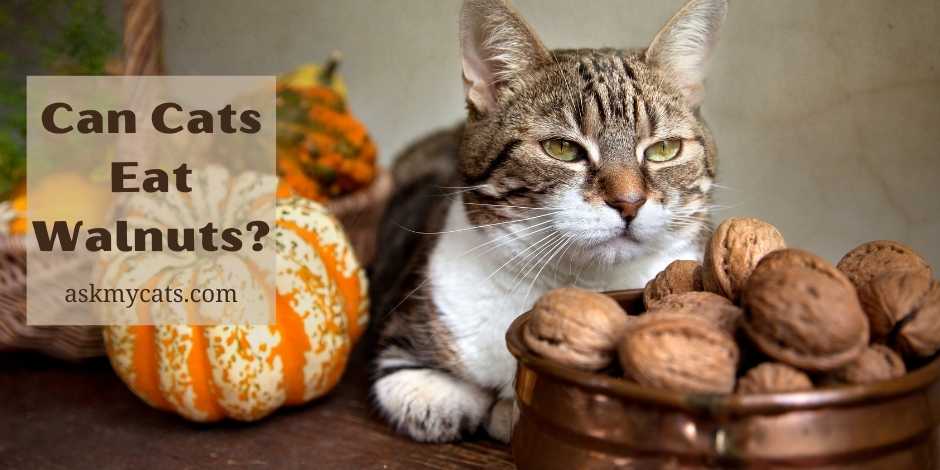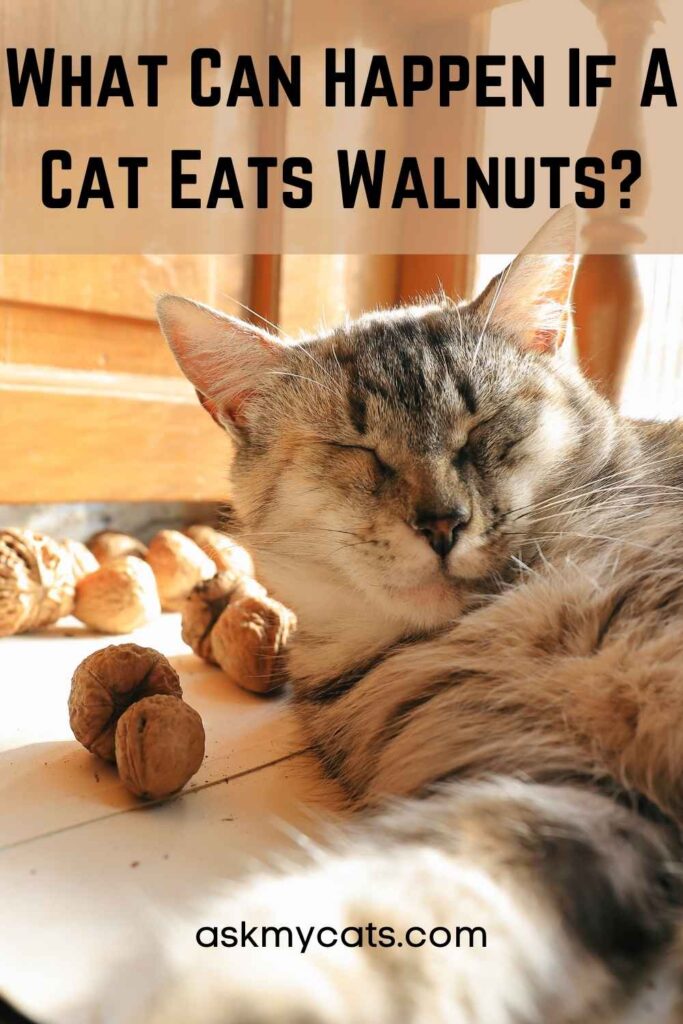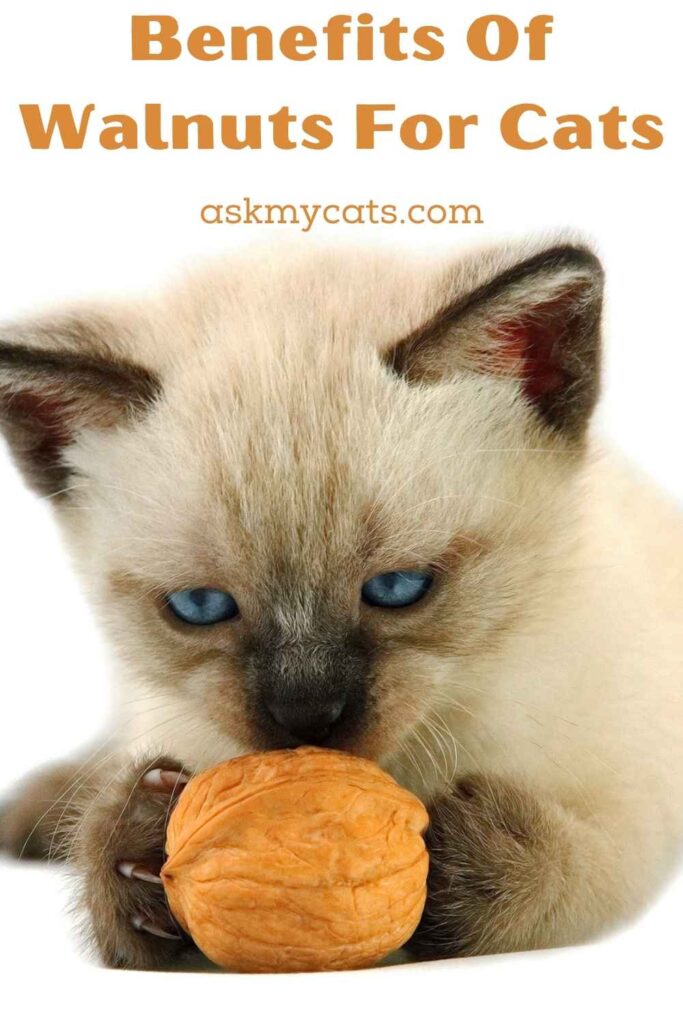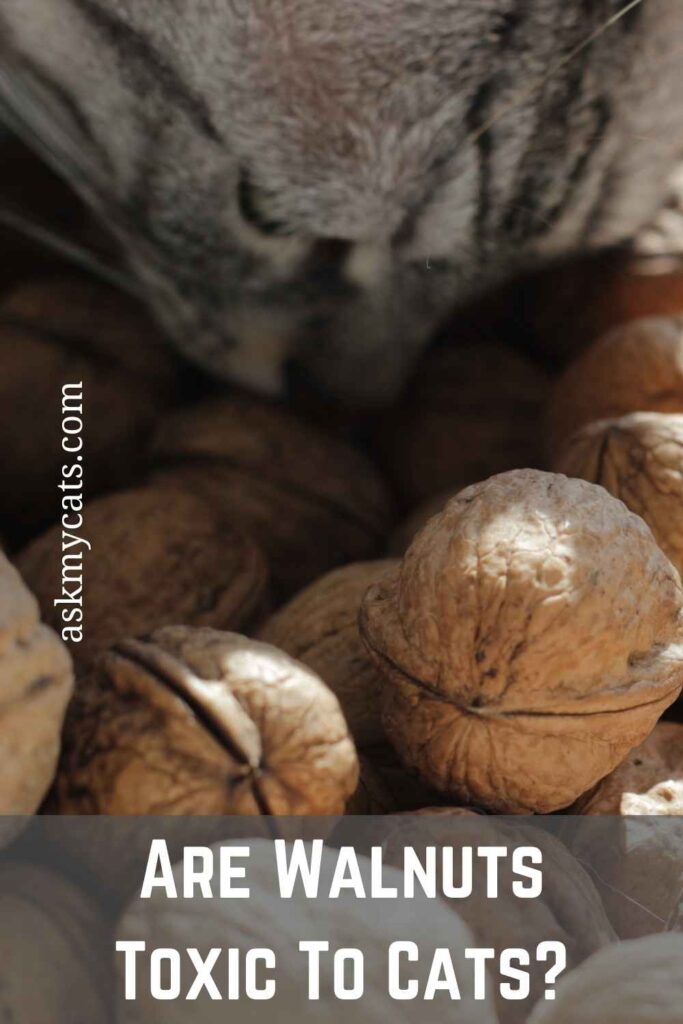Cats can eat walnut but they should not continue eating walnuts as a daily routine to avoid health complications.
A portion of a walnut would not take the pet to the veterinarian’s operation room in a life-or-death emergency (as it would if a dog ate it), but walnuts are not healthy treats for cats. They will make you feel nauseous and uncomfortable.
Consider a little animal or a cat if an adult is only allowed to eat a quarter cup of plain walnuts per day. Only a teeny-tiny bit will suffice.
Walnuts have a lot of fat, which can cause diarrhoea and vomiting in cats. Walnut consumption on a regular basis can cause pancreatic inflammation, as well as kidney failure.


Give Your Cat the Perfect Day
Get the Free Ebook!
Can Cats Eat Walnuts?
No, you cannot feed walnuts to your cat because these nuts are harmful to pets as they can damage the nervous system.
To be sure, it’s always best to avoid them because they don’t have any unique dietary components that will make them a suitable addition to a cat’s diet.
Walnuts are among the nuts that cats can avoid, although there are some safe alternatives, such as hazelnuts or pine nuts.
Cats don’t appear to react as poorly to nuts as dogs do, so you won’t have to send them to the doctor if they ingest some.
Around the same time, since they have no tangible advantages, you can stop intentionally feeding them.
What Can Happen If A Cat Eats Walnuts?
The advantages of walnut use are well-known. They help with weight loss by reducing inflammation and improving gut well-being.
Along with diabetes management and blood pressure control! But, do these well-being benefits even apply to cats?
When cats eat walnuts, their digestive tracts experience a variety of problems. It’s possible that a cat won’t die if it eats a walnut by mistake. However, the digestive tract is harmed. Since walnuts have a high fat content, this is the case.

Humans have a much bigger tummy than most animals. As a result, walnuts don’t seem to have as much of an impact on our stomach.
Cats, on the other hand, have a much narrower digestive system. This means their digestive tract, which is still sensitive, is going to have a hard time with it.
If your cat eats walnuts by mistake, you should expect the following symptoms:
- Failure of the kidneys
- Vomiting and Diarrhoea
Humans may benefit from consuming these nuts in a variety of ways.
Walnuts have been shown to improve gut wellbeing, help in weight loss, and reduce inflammation.
They also aid in the management of diabetes and the reduction of blood pressure.
But do these wellness benefits apply to your feline companion?
No, is the simple answer.
When cats consume walnuts, their digestive tracts can get inflamed. Cats will not die if they eat walnuts, but they will be in a lot of pain. This is due to the fact that walnuts are high in fat, something cats do not like.
The stomachs of humans are far bigger than those of our four-legged pets. This is why walnuts have such a minor effect on our digestion.
Your furry friend’s digestive system, on the other hand, is very thin in comparison to yours. This indicates that the nut would irritate their already sensitive stomach.
If your cat eats a walnut, they will vomit, have diarrhoea, and have kidney failure.
So never, ever feed a walnut to your cat.
Can You Feed Salted Walnuts To Cats?
No, because cats are also more at risk from salted walnuts. This is due to the fact that cats are poisoned by salt.
In particular, it is no longer recommended to use this ingredient to cause vomiting.
Salt poisoning in cats can cause the following symptoms:
- Puking up
- Diarrhoea is a common ailment.
- Appetite damage.
- Laziness
- Tremors are a form of tremor that occurs
- Convulsions
- Kidney injury due to excessive urination and/or thirst
- A coma in worst case
Salt poisoning in cats can be treated in a variety of ways, including IV drinks, vomiting, electrolyte control, compassionate care, and medication for brain swelling.
Other uses of salt inside your house include salt lamps, seawater, table salt, rock salt, paintballs, and handmade play dough, in addition to walnuts.
If you suspect your pet has swallowed salt, contact your veterinarian right away.
Can You Feed Chocolate Walnuts To Cats?
Chocolate-covered walnuts are a decadent treat for humans, but they can never be fed to cats. Although a chocolate bar may not be their cup of tea, milk-based chocolate drinks can be dangerous in the presence of cats.
Theobromine is an element used in chocolate. Humans can normally metabolise this, but cats cannot. This can cause a toxic build-up of the substance in their bodies, which can lead to serious health problems like liver failure.
If your cat eats your chocolate, they may exhibit the following symptoms:
- Vomiting
- Diarrhea is a common ailment.
- Breathing quickly
- Heart rate has increased.
- Convulsions
- Rigidity in muscles
- It’s a fever
If you experience any of these symptoms, you can call your veterinarian right away.
If you find your furry friend eating sweets and you catch them, take them to the vet straight away. If detected early enough, a veterinarian will cause vomiting to remove the contaminated food from your pet’s bloodstream.
If your cat eats chocolate, he or she will vomit naturally; however, you should never attempt to cause vomiting on your own.
Any examinations, such as a thorough physical inspection and a urine examination can be performed at the veterinarian’s office.
They can even perform an ECG (heart test) on your pet to ensure that their heart rate is within reasonable limits. There is no treatment after the signs appear; the only option is to treat them.
Benefits Of Walnuts For Cats
Giving walnuts to cats has already been stated as a bad idea. However, there are times when serving the nuts to your kitto as a snack is a good idea.
In such situations, the main concern should be the potential health and nutritional advantages of walnuts for your pet.

1. Supports Brain Functions
Walnuts are high in polyunsaturated fat, Vitamin E, and polyphenols, which can help your cat’s brain stay healthy and work well.
These compounds suppress oxidative stress in your cat’s brain while also inhibiting the actions of inflammatory agents.
As a result, they can help to avoid brain injury, improve memory, and relieve anxiety in cats.
2. Prevent Premature Aging
Cats, like humans, may develop signs of premature ageing. However, a walnut cookie now and then could make all the difference.
Minerals in the nuts improve motor processes and delay the onset of ageing symptoms.
3. Prevent Heart Disease
Walnuts contain a number of compounds that help to keep the heart safe.
Walnuts, in particular, are high in alpha-linolenic acid (ALA), which has been found to reduce the likelihood of death from heart disease.
4. Boost Your Cat’s Immunity
When compared to other nuts, walnuts have the most antioxidants. Melatonin, polyphenols, and Vitamin E are examples of antioxidants.
These antioxidants work together to protect body cells from the oxidative damage caused by “bad” LDL cholesterol. These benefits are particularly beneficial to cats that have cardiac or cardiovascular problems.
Overall, walnut antioxidants can aid in the prevention of various diseases, especially inflammatory conditions such as cancer.
Other advantages of walnuts for cats include the following:
Contain ellagitannins, a form of polyphenol that prevents your cat from diabetes type 2.
Are high in fibre, which helps to maintain a balanced stomach, and have appetite-suppressing properties, which can benefit obese or overweight cats.
There are a variety of reasons why your cat could profit from eating walnuts. However, the issue of whether walnuts are healthy for cats or unsafe for cats remains unanswered.
Are Walnuts Toxic To Cats?
Cats’ digestive systems treat plant-based matter, such as walnuts, as alien substances because they are obligate carnivores. As a result, walnut consumption can cause stomach inflammation, which may manifest as vomiting, diarrhoea, or abdominal pain.

To begin with, keep in mind that cats are obligate carnivores. As a result, they can only eat animal protein to survive.
Second, walnuts, like most nuts, have a high fat and oil content. Significant quantities of fats in your cat’s diet will irritate his stomach, resulting in vomiting and diarrhoea. And this may lead you to ask if walnut oil is good for cats.
The reaction is a categorical no. Walnut fats and oils can cause stomach discomfort in cats, as well as pancreatitis.
The inflammation of the pancreas is known as pancreatitis. It happens because the pancreas produces digestive juices but does not release them into the digestive system of the cat.
Rather, the juices activate the liver and begin to digest the tissues.
Diarrhea, vomiting, and stomach pain are all signs of pancreatitis.
Another potential side effect of walnuts for cats is the high sodium level of the nuts. Cats can avoid high-salt foods because they can cause sodium ion poisoning.
Sodium poisoning in cats can cause anything from stomach upset to epilepsy, tremors, multiple organ failure, and death. So, do walnuts have the ability to kill cats?
It’s possible that your cat won’t die right away if he eats walnuts. However, if the cat is not handled as soon as possible, it could suffer serious side effects that could lead to death.
So far, we’ve discussed the advantages and disadvantages of giving walnuts to your feline companion. But you might also be curious if you should feed walnuts to your pet.
Ok, the conclusion remains the same: it is not advised.
Avoid giving your cat walnuts of any way if at all possible. And this raises the question of whether cats will eat black walnuts.
If provided in moderation, walnuts are not immediately poisonous to cats. However, it suggests that there are more potential threats than advantages. As a result, it’s best to stop giving your kitto walnuts altogether.
Frequently Asked Questions
Are Walnut Shells Dangerous For Cats?
Walnut shells are durable and sometimes sharp, posing a choking threat to any pet. Furthermore, cats find it difficult to eat hard objects such as walnut shells, so keep them hidden.
Can Cats Eat Black Walnuts?
Black walnuts are a unique variety that has long been considered to be particularly dangerous to dogs and horses. As a result, it’s understandable to ask if they’re equally poisonous to cats. Although black walnuts are not immediately poisonous to our feline companions, they can cause some of the same side effects as regular walnuts.
Can Cats Eat Walnut Cake?
Cats are inquisitive animals, and we often catch them sniffing around our food. Not only are the walnuts in walnut cake harmful to cats, but the sugar, fat, and sweetening agents are also unhealthy for them.
Can Cats Have Walnut Milk?
Walnut milk is not approved for cats for the same purpose, due to the high levels of sugar, oil, and salt in walnuts. Although the milk will be easier for them to digest, the chances of stomach pain, vomiting, and diarrhoea will remain the same.
Can Cats Have Walnut Butter?
Walnut butter is rich in fat and salt, putting the cat at risk for signs ranging from stomach pain to epilepsy, as well as more severe illnesses like pancreatitis or sodium ion poisoning. Keep your cat comfortable and safe by avoiding walnut butter wherever possible.
Final Words
Hopefully, this post has answered all of your concerns about cats and walnuts.
About the wide variety of health benefits provided by walnuts (from improved memory to heart attack prevention), it is not advised that you feed walnuts to your pet unless explicitly instructed to do so by a veterinarian.
It’s not worth putting your beloved pet’s welfare at risk, but please lean on the side of caution when feeding human foods to dogs.
Let me know in the comments section below about your experiences!
